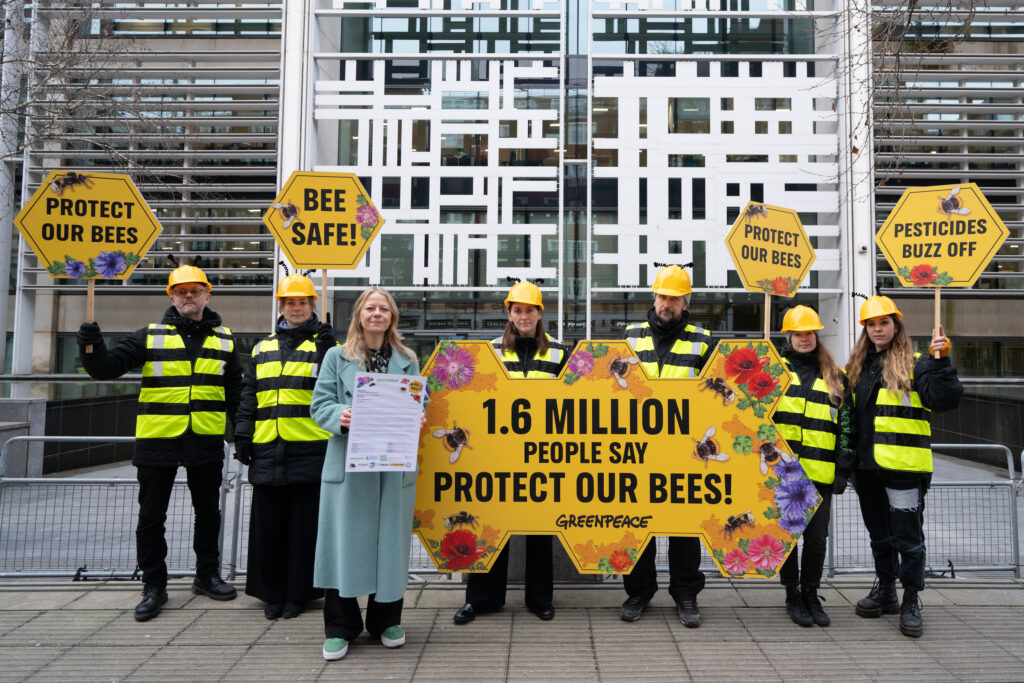
It’s true that polluters, billionaires and oligarchs are doing all they can to shut down dissent and line their pockets at any cost to our planet.
But they’re no match for our global movement. Together, we’re the majority. Activists, supporters, volunteers, campaigners, ship crews, scientists and investigators – of all ages and from every walk of life. You can see here just how much that means for everything you care about.
A bee-utiful start to 2025
The year began with a big buzz, as 1.6 million of you made sure bees were safe from deadly neonicotinoid pesticides. Every year from 2021 to 2024, the government allowed emergency use of these bee-killers. But our bee petition became one of our biggest ever, and ministers finally prioritised pollinators – banning neonics for 2025. Sweet as honey.

You blocked the Jackdaw and Rosebank oil fields
Also in January, a Scottish judge confirmed what we’d argued in court since 2023: plans to drill at the Jackdaw and Rosebank North Sea oil and gas fields were illegal. This is huge. The verdict means politicians and Big Oil corporations can no longer ignore the emissions impacts of new fossil fuel projects. With you, we’ll keep fossil fuels in the ground where they belong.
Call this ocean protection?
In March, Greenpeace investigators revealed that 28 supertrawlers – each at least 100m long – had spent 36,918 hours fishing in supposedly protected UK waters since 2020. The exposé sparked headlines and pushed MPs to act. By June, ministers had promised to ban destructive bottom trawlers in 41 UK Marine Protected Areas. Our investigations, reports and briefings drive real change – and it’s Greenpeace supporters that make them possible.
US embassy pond turned red
In April, our activists used hundreds of litres of non-toxic, biodegradable dye to turn the pond outside the US embassy in London blood red. Our message? Stop Arming Israel. By selling weapons, ammunition and hardware to the Israeli government, the US is contributing to a devastating loss of life in Gaza.
50 countries ratify the Global Ocean Treaty!
Two years after the historic Global Ocean Treaty was agreed, 50 countries have now signed it into their national laws – a crucial step to making it legally binding worldwide. After 20 years of campaigning, we’re on track for a full treaty by the end of 2025. But shamefully the UK is still dragging its feet. So we’re turning up the heat everywhere from international talks to Westminster, where we recently hung the giant ‘Lammy Don’t Dally’ banner you can see in the slideshow below.
Exposing the fast fashion graveyard
In June, reporters from Unearthed (Greenpeace’s investigative journalism unit) showed how discarded clothes from retailers like Next, Asda and M&S are being dumped in protected wetlands in Ghana, harming wildlife and local communities. The story made national headlines and forced retailers to admit: we need to do better.
Putting sewage in the spotlight
Also in June, Unearthed reporters dug into industry documents to discover that water companies are panicking that they could soon be unable to dispose of millions of tonnes of sewage sludge. The reason? Tougher pollution rules could prevent sewage from being spread on farms as fertiliser year-round. This story was broadcast on the BBC and raised in a parliamentary question.
Helping kids talk about the climate crisis
As a YouGov survey showed most under-12s are worried about climate change, we teamed up with a leading eco-anxiety expert to publish a guide to talk to kids about climate change. It’s packed with simple tips to empower the next generation of climate campaigners.
Best photos of 2025… so far
This year's most powerful pictures, captured by Greenpeace photographers around the world.
Ready to step it up?
This is just a taste of the progress and protest we’ve made possible together already in 2025. The threats to our planet are growing. So are the attempts to silence us. But, thanks to you, we’re only getting stronger. Let’s step it up for the second half of 2025. See how you can get involved.

